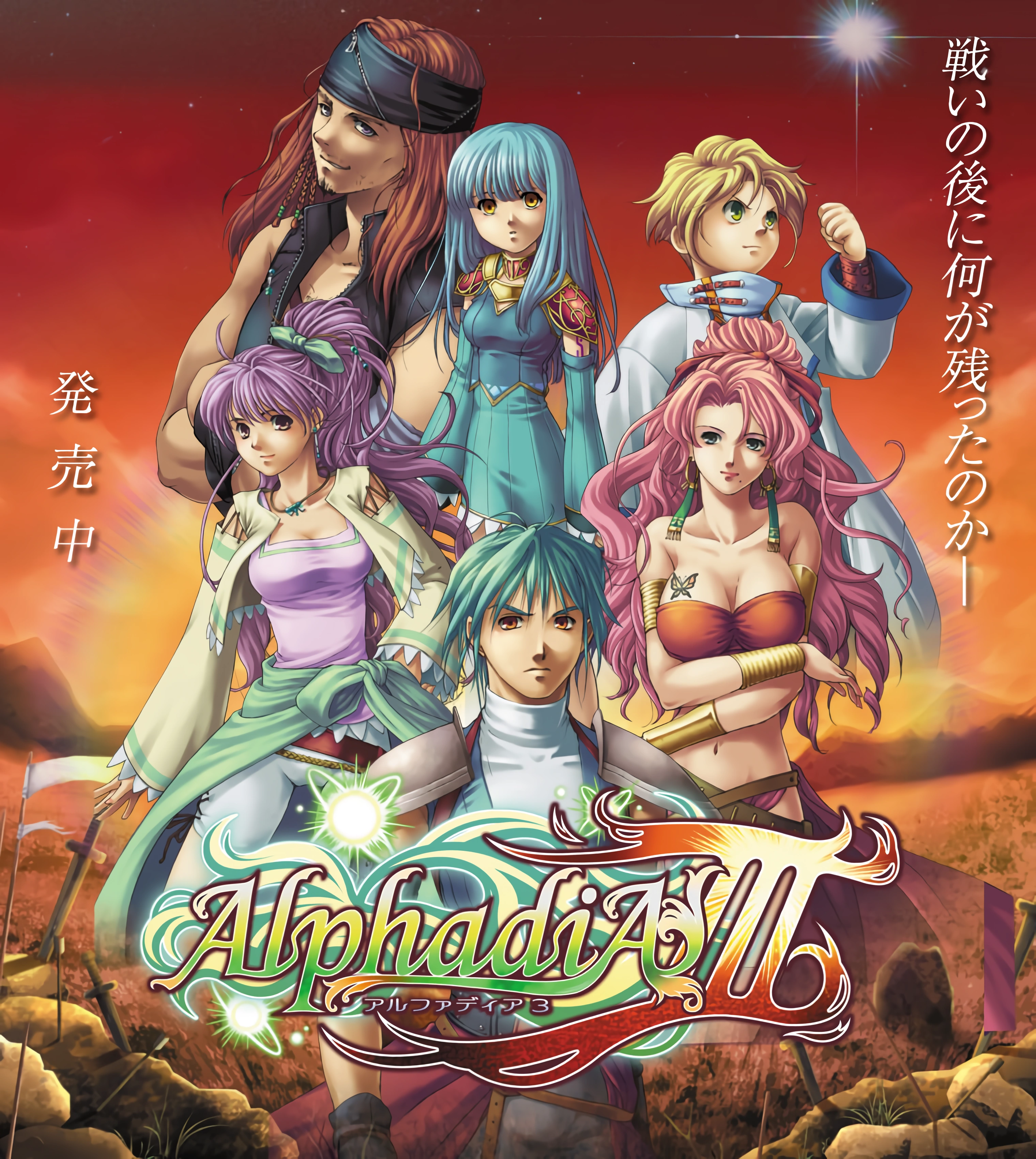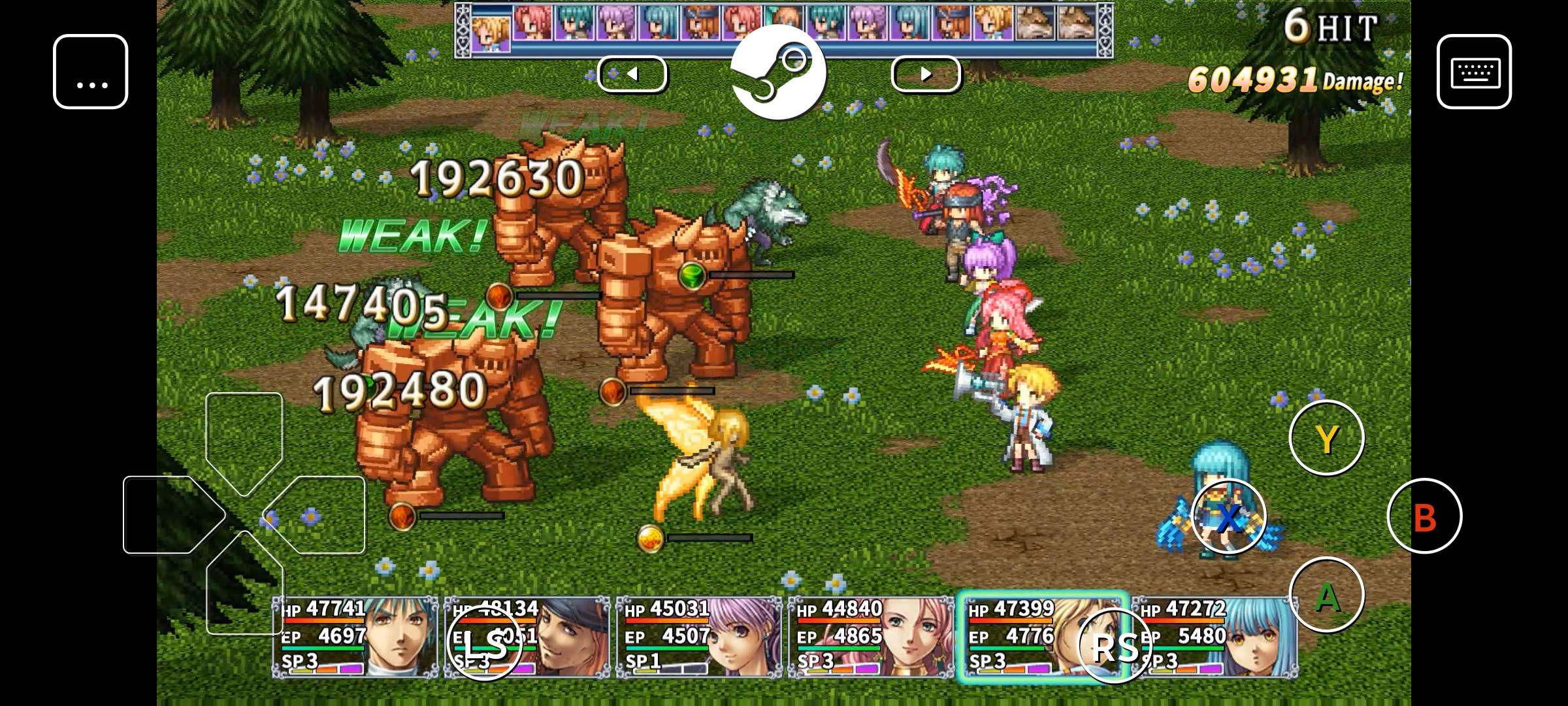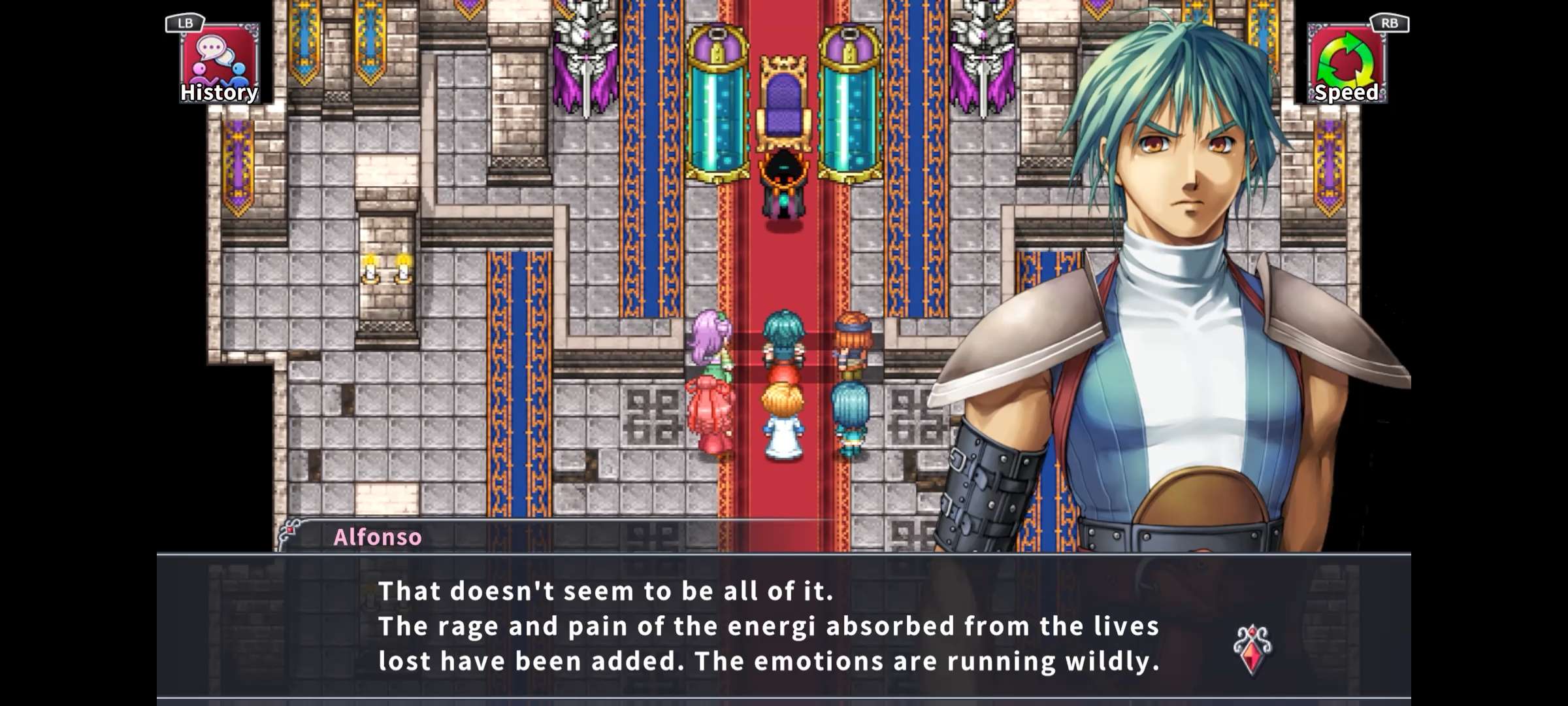Search
[{{{type}}}] {{{reason}}}
{{/data.error.root_cause}}{{{_source.title}}} {{#_source.showPrice}} {{{_source.displayPrice}}} {{/_source.showPrice}}
{{#_source.showLink}} {{/_source.showLink}} {{#_source.showDate}}{{{_source.displayDate}}}
{{/_source.showDate}}{{{_source.description}}}
{{#_source.additionalInfo}}{{#_source.additionalFields}} {{#title}} {{{label}}}: {{{title}}} {{/title}} {{/_source.additionalFields}}
{{/_source.additionalInfo}}- Details
- Category: Computer
- By Dana Schwanke
- Hits: 1332
Alphadia III (PC)

Alphadia III
Developed By: EXE-CREATE
Published By: Kemco
Initial Release: December 18, 2009 (Japan Feature Phones)
Latest Release: September 19, 2025 (PS4, PS5, Xbox Series X|S)
Available On: Android, Japanese Feature Phones, iOS, Microsoft Windows, Nintendo Switch, PS4, PS5, Xbox One, Xbox Series X|S
Genre: RPG
ESRB Rating: Teen (Fantasy Violence, Suggestive Themes, In-Game Purchases)
Number of Players: Single-player
Price: $19.99 (+$21.96 for downloadable content)
Thank you Kemco for sending us a review code!
For the second review in a row, it seems I have been roped into talking about a game that was released for mobile YEARS ago only to be re-ported to modern devices just this year. Unlike SpongeBob: Krusty Cook-Off, though, this time we are looking at a game that was released exclusively for Japanese feature phones in...2009?! That's right, Alphadia III is the third installment in a nearly 20-year-old RPG video game series that debuted for Japanese non-smart phones. Since some of the newer Alphadia titles have been released for more modern platforms, Kemco has been re-releasing the older entries in the series for modern devices, too. This effort started with Alphadia Genesys, initially being released for iOS and the Wii U in 2014, which was ported to PS4, Switch, and Xbox One in 2020.
Alphadia III, confusingly, is a prequel to Alphadia I & II and makes it the earliest entry in the franchise's timeline (such as it exists). It takes place during a period known as "The Energi War". "Energi" describes the elemental forces that govern the world and are a part of every living thing. During the time of The Energi War, the three primary kingdoms of the world have largely perfected the science of cloning. These "Energi clones" exist as a mishmash of sci-fi tropes that seem to exist paradoxically: They are "mostly human" but can be "rebooted", set to self-destruct, or enhanced in unexplained ways; they are programmed for mindless obedience but are capable of self-determination; they are lab-grown but can exist as children. Alphadia III follows the adventure of Alphonse (a.k.a. Alf), an Energi clone who abandons his duties as part of the kingdom known as the Luminaire Alliance to work with a group of resistance fighters attempting to stop The Energi War and bring about world peace.
Alphadia III's gameplay is very typical of turn-based RPGs. Part of your time will be spent exploring the overworld, towns, and dungeons. During dungeon and overworld exploration, you'll experience random encounters with enemies and begin a battle sequence. Turn order is largely determined by each character's Agility (AGL) stat, though performing certain actions can actually push one back in the turn order. Luckily, the turn order is shown at the top of the combat screen, showing the order for the next several turns for each actor on the battlefield, a touch I appreciated. It helps you to focus fire on the enemies whose turns are coming up sooner, giving you a chance to dispatch them before they can attack you. At the end of battle, characters will be rewarded with experience to work towards levelling up their base stats as well as their natural Energi affinity, giving them access to new spells and abilities. Characters gain experience even if they fall during battle, which makes my OCD brain VERY happy. Characters also completely heal after every level up in the Normal difficulty setting, meaning you won't be stocking up on tons of healing items or stopping back at a town every few minutes to heal after a particularly grueling time in the dungeon.
There are a lot of different aspects to gameplay, more than I would anticipate from a typical pixel RPG. Let's look at combat for starters. Players have 3 types of attacks: regular attacks, Energi Arts, and SP Skills. Regular attacks do physical damage, Energi Arts do magic damage, and SP Skills do a variety of different things. While regular attacks don't require anything special, increasing each characters' Energi ranks and SP Skills as well as learning new attacks in these categories requires combinations of equipping the right items and using those skills in battle. You also gain access to "Arrays", which is essentially just a way of arranging your characters on the battlefield to gain special effects, such as increased physical damage from characters in the front row or extra gold at the end of battle. These must also be learned through meeting specific requirements such as visiting the right place at a certain point in the story or by winning a certain number of battles with a specific item equipped on a particular character.

Strong Points: Easy-to-play; quick text scrolling and movement; commands and settings to simplify gameplay and weapon/armor equipping
Weak Points: Unnecessary, expensive downloadable content (DLC); somewhat confusing story (and numbering convention); graphics are just okay; easy to get lost in menus; some mechanics can only be learned by trial-and-error or reading in-game multi-page explainers; sub-par Japanese-to-English translation.
Moral Warnings: Off-screen murder of children; some questionable outfits on characters; soldiers treated as expendable objects; skeletal, ghostly, and semi-demonic enemies
Outside of combat, there are a variety of quest types, shop types, and necessary currencies. For quests, there are "Scenario" quests, which include the main quest and side quests. Side quests are almost always so easy they can be completed in 10 minutes or less. Then there are also Missions, which entail doing things like "Use 'Arrays' in Combat 15 times" or "Defeat 1000 Enemies". For shops, you've got your normal Equipment and Item shops that you pay for with gold picked up from defeating enemies. Then, in order to get some of the special items mentioned in the previous paragraph, you have to go to an Energi Exchanger, where you can exchange Energi Elements for items. How do you get Energi Elements? Primarily by using the Energi Crock, a cauldron accessed from your in-game menu and toss your unwanted stuff into.
There's also an in-menu "Shop" that is more akin to a cash shop like you'd see in an MMO which uses Comet Stones as currency. These you get 10 at a time sometimes after a battle. Here, you can purchase special, high-tier items such as special keys that open doors to valuable treasure in-game; items to permanently upgrade your characters; high-tier weapons and armor; and Secret Rooms which permanently increase things like damage done or experience gained across ALL of your save files. You also get two roulette tickets per day to try to win a couple rewards. Basically, between in-combat and out-of-combat strategies and the number of items and shops you need to keep track of, Alphadia III rides the border between "interestingly complex" and "needlessly complicated".
The in-game "Shop" also houses a link to open the purchase page for the game's DLC. What's in the DLC? Permanent boosts to your damage done and experience gained. Let me be clear: at no point during the main quest or any of the side quests did I at any time ever feel like I was doing too little damage. In fact, not a single main quest boss has taken me more than a couple minutes to defeat. There are some islands you can visit to farm experience later in the game, and some of them, if visited too early, will completely wipe out your party before a single one of your characters can act. But on the other hand, there seems to be a cap on the amount of experience needed to level after a certain point. Close to the end of the game, I found a good levelling spot, and after every single battle, I gained 1-3 levels...for over 100 levels straight. So I don't know what on earth the DLC is needed for other than a straight money grab for people who have never farmed a moment in their life in an RPG, but it in no way seems necessary to me, especially considering it's more expensive than the game itself.
It's not like Alphadia III is even a slow game. Dialog and movement are faster, and random encounters occur less often, than in just about any RPG I've played. During the farming moment I mentioned above, I spent more time walking around waiting for an encounter than I would then spend in the battle. In combat, there is an "Auto" button that will battle for you based on tactics you can set in the menus. When in auto-battling, most animations are skipped and combat sails along. The damage numbers I was doing started to make the game feel more like Cookie Clicker: flashing lights, big animations, and 6-digit damage numbers flying around everywhere. The game lets you immediately teleport to any named location you've visited before, even from inside a dungeon. Dungeons have teleporters that let you instantly move around to the end or sometimes even the middle if it's long enough. There are also menu options when equipping characters to automatically equip the strongest items onto each character, if you're feeling lazy. Personally, I recommend buying the "Treasure Storehouse Key" from the in-menu "Shop" whenever you come across a treasure storehouse and using the weapons found in there for your characters; they give each character an automatic +1 to their SP meter at the start of each encounter, and the SP Skills are usually the fastest way to dole out punishment.
In terms of art and music, Alphadia III is okay. There really aren't that many music tracks, and music changes very abruptly during conversations. The music isn't bad, but it's not anything you'll want to look up the sheet music for, either. Similarly, the pixel art style isn't terrible, but the characters' big heads and clunky movements during dialog are a bit underwhelming. In-combat animations are a little better, but nothing extraordinary. The graphics during attacks, though, can get quite intense, which I liked. A bigger concern, though, is the localization: it's not good. It's not as bad as the instructions on cheap Chinese knock-offs purchased through Amazon, but it's nowhere near the level of quality I've come to expect in modern Japanese to English localization efforts. You can definitely tell what the characters are trying to say and convey, but item descriptions or instructions in the menus can occasionally be a bit obtuse (especially with the aforementioned item needed to learn new SP Skills, whose description makes it seem like you can unlock some super secret techniques by repeatedly using skills with that item equipped).

Higher is better
(10/10 is perfect)
Game Score - 60%
Gameplay - 11/20
Graphics - 4/10
Sound - 5/10
Stability - 5/5
Controls - 5/5
Morality Score - 66%
Violence - 7/10
Language - 6.5/10
Sexual Content - 6.5/10
Occult/Supernatural - 5.5/10
Cultural/Moral/Ethical - 7.5/10
In terms of stability, there are some quirks or very, very minor bugs when navigating the menus. Sometimes, when you press the Back button while modifying one character's equipment, it well send you back to the previous screen, while other times it will just send you back to select another character to modify equipment. When you accept rewards for side quests (which you do in your menu as opposed to being gifted the item from whoever you're running the quest for), you have to Back out of the Scenarios menu entirely before you can go back and accept a reward for another. They're very minor as far as bugs go; a very minor inconvenience at worst.
Morally, Alphadia III has some concerns. Since everything is in a pixelated style, there's very little graphically that happens; even when violence does occur outside of battles, it's limited to watching one character sprite smack into another and watching the other go flying or falling down injured. That being said, there is a lot of mature subject matter in those scenes. One of the opening cutscenes has a villain killing a child just off-screen; another side-quest depicts an abusive, alcoholic father beating his child before one of the main characters steps in. There are other references to alcohol throughout the game as well.
Then there are the sexual themes. The main characters in the game all have portraits that are displayed in menus and during dialog. Of the three main female protagonists, only one is moderately dressed, with one wearing a lower-cut top exposing some cleavage and the other being a particularly well-endowed woman with a top that displays her curves quite prominently. This last character makes remarks about being hot enough to want to disrobe, has a wardrobe malfunction in a windy tunnel, and suggests that she and another character may have had an off-screen sexual encounter during part of the story. One of the male characters is called "Lewd" multiple times as he makes sexual comments during each one of those moments. Then in the post game, there is a suggestion that one of the NPCs finds a character described as a "little girl" attractive. Whether intended or not, it's definitely skeevy.
There are occult references: One is the reappearance of a type of monster that is a cluster of flaming, floating skulls; and the other is that one of the powerful mid-game monsters is worshipped as a "water deity" by a nearby village (though the monster admits she is not a god, just a powerful entity). Ethically, you play as a band of rebels working against all three of the major kingdoms to put an end to their wars. Despite constantly talking about how they don't want violence, they sure do get into a lot of combat situations, though they often try not to kill anyone (the game even calls it "suppressing" enemies in the achievements). Mindless bloodshed is always associated with the villains, until the endgame, where your characters state they'll kill the mastermind continuing the war if it means saving the lives of innocent people. And of course, we can't forget the shady DLC money-grab, which is both unnecessary and the type of thing I would expect a certain type of child to steal their parents' credit card to buy for themselves.
At the end of the day, Alphadia III wasn't a bad game...but it wasn't a good one either. Parts of it were fun, sure, but the vast majority of it was subpar: The story, the translation, the side-quests, the music, the graphics, the battles that were over too quick...it feels like Alphadia III was more focused on how to speed up the game and give a "big numbers on screen" experience than in providing a memorable one. I mean, I beat the final boss in a single turn. There's some post-game content, but if you can't get excited for the main game, then what value does post-game content really provide? It boils down to a few optional battles so much more difficult than the player will likely be capable of by the end of the main game that it just means they'll need to spend hours farming (and being tempted to pay for the "DLC" to make it happen faster) to finally beat. $20 isn't a ton of money if you're a huge fan of JRPGs, but for comparison, each entry of Final Fantasy I-VI Pixel Remaster MSRPs for around $15, and most of those entries are absolute classics. Between the cost and the myriad moral issues, for the average player who wants a game that will stand the test of time, I cannot recommend Alphadia III.
-maestro_dana






